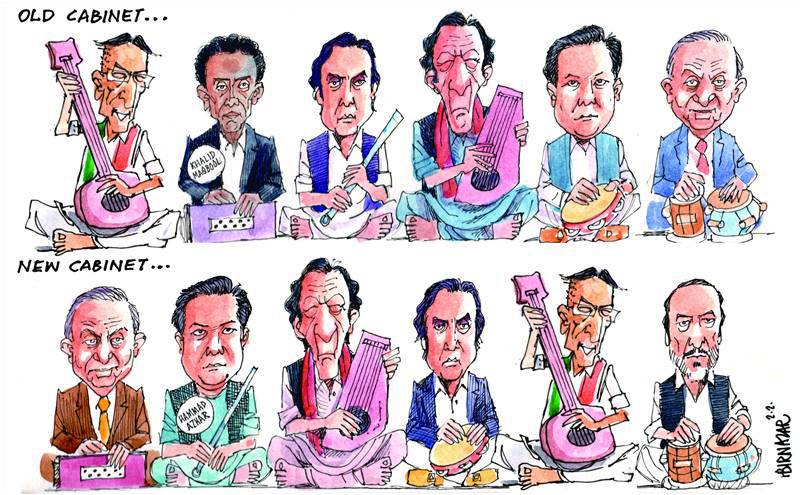

Sheikh Rashid, the inveterate chief of his own one-man political party, represents both the Miltablishment and the ruling Pakistan Tereek-e-Insaf (PTI). But when these two are not on the same page – which is increasingly the case these days – he demonstrates a unique ability to speak with a forked tongue to please both masters. Thus we were justified in wondering about the truth behind his recent statement that he would meet Prime Minister Imran Khan and advise him to improve relations with the media and the opposition because “national unity” was the need of the hour in the battle against COVID-19 (Miltablishment’s position) even as he, in the same breath, advised NAB to “drag Shahbaz Sharif to the Accountability Court because he would not voluntarily attend its proceedings” (PM’s position).
In the event, the Sheikh’s noble “mission” has foundered on the rock of Imran Khan’s stubborn vindictiveness against both the opposition and the media. Mr Khan’s hounds are baying for the blood of the Sindh Chief Minister, Murad Ali Shah, because the media has praised Mr Shah’s swift and decisive moves to combat COVID-19 in his province while criticizing the PM’s confusion and double-speak regarding national anti-COVID-19 policy. The PM won’t allow the National Assembly to meet so that the opposition can challenge the wisdom of his policy. Now the opposition has accused the PM of leaning on NAB to take the top opposition leaders into custody and shut their mouths.
More ominously, we gather that the electronic media is up for the big stick from PEMRA. Apparently the stage is set to give the PEMRA Chairman suo motu powers to suspend the license of any TV channel. Such power would violate the letter and spirit of PEMRA rules that stipulate that action against any channel can only be ordered after a complaint has been received and after the respondent has been given a chance to explain and defend his position, and only after the Chairman has formally consulted and received the approval of the other members of PEMRA. Under the proposed amendment, as one insider put it, “the PEMRA Chairman would be able to order the suspension of any channel without consulting anyone, copy orders to SUPARCO that operates PAKSAT to take the channel off air, followed by notices to PTCL and cable operators to follow suit, all in the space of a few hours”. If such an order is passed on a Friday, the offending channel won’t be able to approach any High Court to “stay” the action before the following Monday at the earliest. In any case, even if relief is granted, PAKSAT and Cable Operators are not likely to restore the status quo ante for another couple of weeks, thus plunging the channel into financial loss and bringing it to its knees.

Imran Khan insists the Pakistani media is not just the “freest” in the world, it is anarchic and completely unaccountable. Yet there isn’t a single media watchdog, or independent newspaper or channel, at home or abroad that hasn’t documented the terrible plight of the media on Imran Khan’s watch. At last count, international references to highlight the tight and unprecedented censorship in “democratic” Pakistan had exceeded two dozen respected voices, including from the EU. The detention of Mir Shakil ur Rahman, the owner-editor of Jang-GEO the largest media group in the country, is a pointer in that direction. NAB has dug up a case from 1986 to frame him. Even if he gets bail from the Islamabad High Court in due course, he won’t be allowed to leave the country and resume residence in the UAE where his family resides. If this sort of treatment can be meted out to the mightly Jang-Geo Group, imagine the alarming plight of smaller fry. As things stand, the few independent journalists left in the country have either been gagged or kicked out of their channels and survive only on crumbs from YouTube.
Three months ago, the media was rife with speculation that the clock was ticking for Imran Khan because the Miltablishment had seen the error of its “selection” and was looking to redeem the situation via a national unity government excluding Imran Khan. The sticking point was Nawaz Sharif’s refusal to strike any deal short of a free and fair election immediately and an explicit understanding that the Miltablishment would henceforth pledge to stay out of politics. But the sudden arrival of COVID-19 put paid to all that. With hostile neighbours bristling east and west necessitating a state of military focus, COVID-19 has engulfed state and society in fear and sent the economy into a tailspin, putting the brakes on any halfway-house option.
Pundits say that COVID-19 could tip the scales either way. If Imran Khan’s anti-lockdown strategy works, he will live to fight another day. But if it doesn’t – if hunger, joblessness, strikes, riots and anarchy break out, or the economy sends out an SOS – it will be back to the drawing board for the Miltablishment again.

